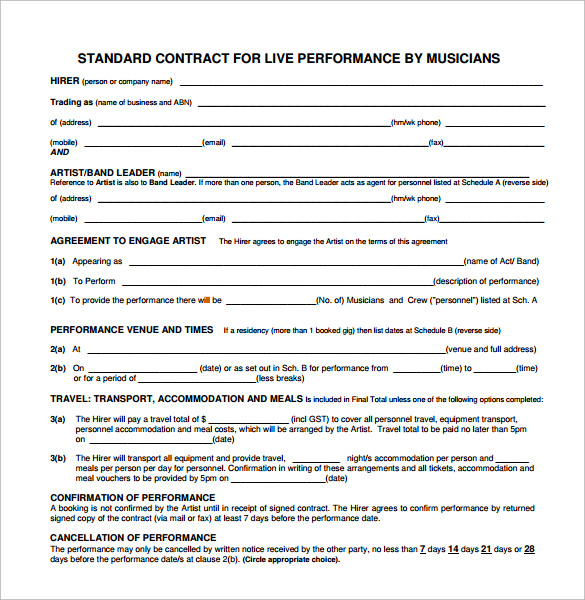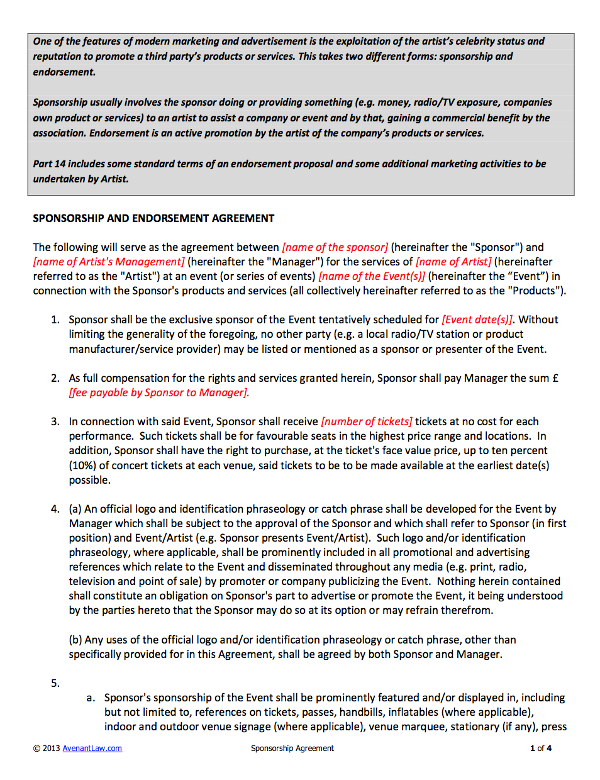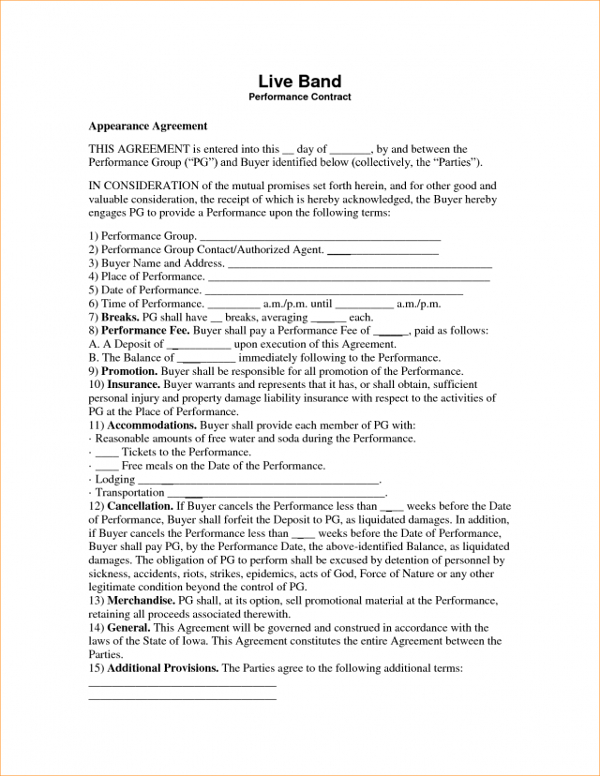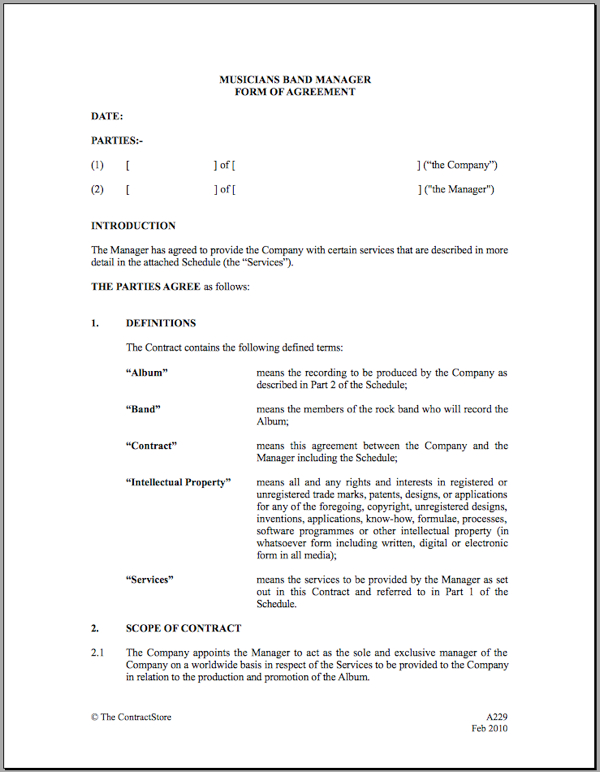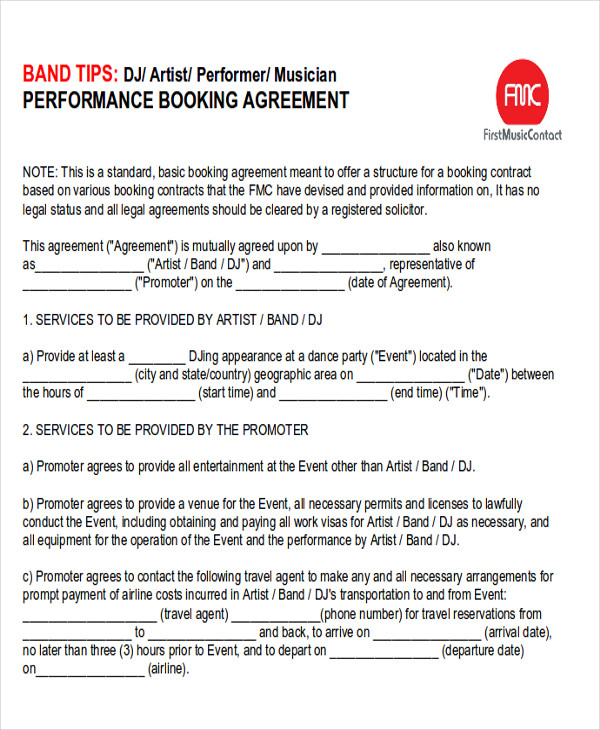9+ Band Contract Examples to Download
So your passion is music and you love to sing and play instruments. You got your own chaps who share the same passion as you and start out playing musical instruments and writing songs just for fun. What started out as jamming sessions turned into playing for your friends’ parties, your families’ events, and so on.
You guys think you have a potential to turn your hobby as an actual career opportunity for you and your mates. You have the potential to make it big. If you’re now at the point where you want take your music career seriously, then it’s time to create a band agreement soon. You may also see contract examples in pdf.
Band Contract Example
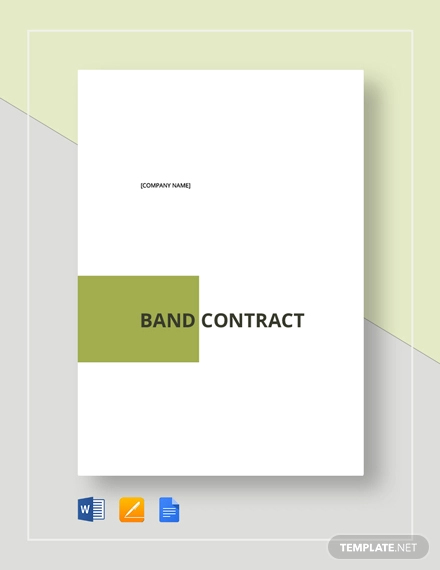
Music Band Example Contract
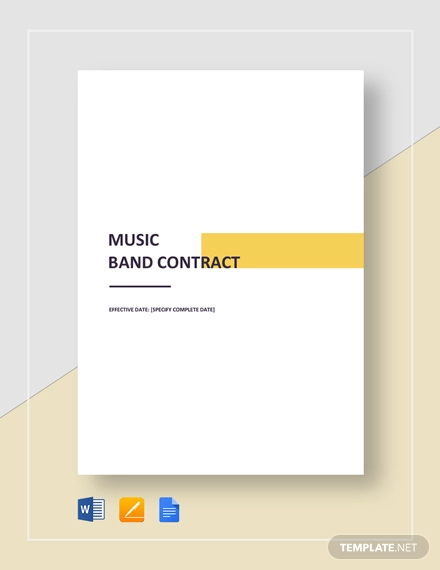
Band Performance Contract Example
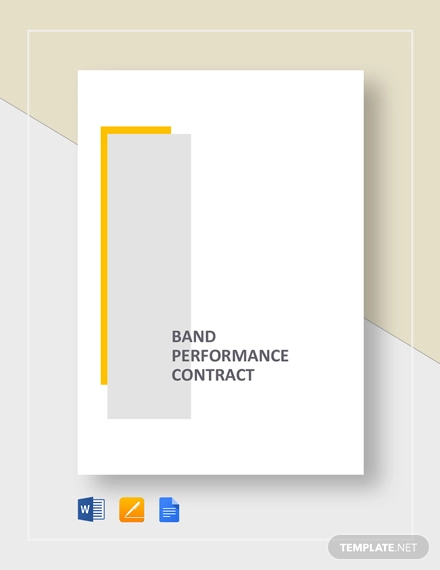
Wedding Band Contract Example
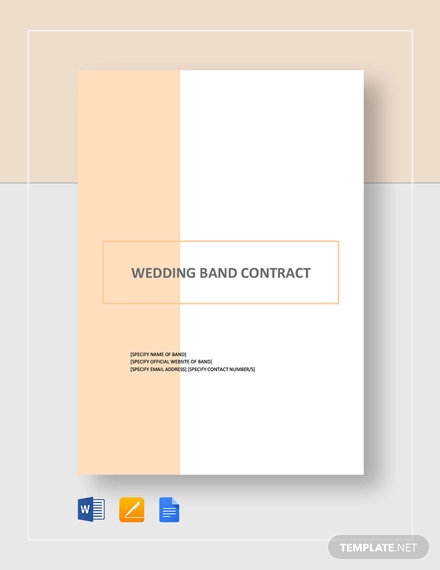
Standard Contract For Live Performance By Musicians Example
Sponsorship and Endorsement Agreement Example
What is a band agreement, exactly?
A formal band agreement is simply a contract. Even if you’re there only to play music, if you want to be serious about your career, there’s always a business relation to it and it will help you settle when it comes to finances and other important stuff. It can be in a variety of formats, but the idea is to ensure that you and your band mates’ expectations are aligned.
A band agreement also helps maintain levels of commitment to the group (It will keep any band members from bailing out) . It’ll clarify everyone’s roles, responsibilities and levels of ownership. Additionally, it will help address any financial concerns, such as who will be paid on what percentage of royalties from recordings, publishing and performances. You may also like key differences between agreements and contracts.
Live Band Performance Contract Example
Why do you need a band agreement?
Complications and disagreements will surely arise at some point in your band’s career (even if you can’t imagine that right now since you guys are the closest chums ever and you always have time together) as there are important matters for you to sit down and discuss it; so having an agreement will come in handy when you need to smooth things out. You may also check out contract examples.
For example, how are major band decisions determined? Is it done through in a democratic matter like an equal vote between all the members, or do certain members have more of a say? What are the consequences if a band member misses a certain number of shows, recordings, or rehearsals? Even if this seems like a drag; start thinking about the kinds of issues that could potentially affect your band at some certain point and do your best (not just you alone, but your band members as well) to come to a compromise on the best way to handle them. You might be interested in examples of writing a wedding planner contract.
The process might sound a little boring or extremely awkward, but that doesn’t mean it takes the fun out of playing music together. When it’s all said and done, your band agreement will actually help keep your experience together harmonious and allow you to focus on the music rather than worrying about how to deal with every little dispute. You may also see sales agreement samples.
So how do you talk it out with your band mates?
As soon as it feels like the band is “going steady,” you should talk to everyone about what the commitment level really is. Bring up the idea of a band agreement to the group. Explain why it’s important and how it’ll help. (In fact, it might make people happy to know what exactly they’re guaranteed as a band member.) Then pick a time to work out the details. You may also like the truth behind service contract checklists.
However, you shouldn’t let the idea of a band being a business ruin the creativity that comes from playing music together. In fact, you’ll probably be saving your friendships and professional relationships by getting everyone on the same page sooner rather than later. You may also check out essential contract templates for the freelance designer.

What specifics should your band agreement cover?
Your band agreement should act as a guide to clarify any questions you or your band members have now, and also to address any issues that you think could arise in the future. At the very least, make sure to cover topics such as:
- Who will own the rights to the band name?
- Who will own which songs?
- If someone leaves the band, can the remaining members continue to use the same band name and play the same songs?
- How will band expenses be funded?
- Where does their income go?
- Who will make the business decisions?
The most important part of the agreement it to determine what will happen if a member leaves the band. This will help prevent a case where someone might sue for their share of the band. Agree on some terms so there will be no dispute when this situation might come up. You may also see examples of writing a gym contract.
Other agreements that you should cover in your agreement should also include the following:
1. General structure
-
Is everyone a partner in the band partnership?
-
Does anyone have a lot more control compared to the others? Is this reasonable?
2. Responsibilities of the band members
-
What are each person’s responsibilities?
-
How much time is expected for rehearsal?
-
Who’s responsible for applying for grants, and registering songs with performing rights organizations.
-
Without a booking agent, who’s responsible to book gigs?
-
Without a social media person, who’s responsible for managing Facebook and Instagram?
-
Without an external manager, who’s responsible for whatever they do?
3. Decision making
Are these following decisions made by majority, unanimous agreement or otherwise? Does anyone have more votes than anyone else? What will be the plan if a decision is to be made by majority? Here are some pointers that you also have to decide:
-
Hiring or replacing a manager, booking agent, accountant, and a lawyer.
-
Binding the band in contract including exploitation opportunities.
-
Check-signing authority.
-
Changing the terms of the Band Agreement.
-
Borrowing money.
-
Selling the band’s property.
-
Deciding which performances to accept.
-
Scheduling rehearsals.
-
Other general business decisions.
4. The kind of music you produce
-
What’s the formula to calculate song writing percentages and performance rights royalty entitlements?
-
Who may administer the music?
5. The money you will receive
-
Recording and performance funds may be an even split while publishing and merchandise might not be. What’s your structure?
-
Who decides what expenses are included?
-
What expense-related decisions may the manager make?
6. Band assets
-
What property (such as instruments, sets, and equipment) is owned by individual members of the band and what’s owned by the band?
7. The name of the band
-
Have you ensured no one else is using the name of your band?
-
Have you registered the name as directed by your state, city, or province?
-
Have you registered for trademark protection?
-
Does anyone have more control regarding the band name? May the band only use the name if everyone is still performing together?
8. Membership
-
Who has the authority to add a member? Does any of the members eligible to invite or kick out band members?
-
How much money, if any, is owed to a former band member?
-
What happens if a band member gets sick, disabled or dies?
-
If a band member wants to voluntarily leave, what notice must be provided and how does that change on tour?
-
How many members does it take to kick someone out?
9. Dissolution of the band
-
What triggers the partnership’s dissolution?
-
Upon dissolution, what happens to the songs, profits, property, name, and who’s responsible for administering all of this?
The potential of making a lot of money or wanting to add someone or kick someone out may end up hurting your band if the awkward conversations about money did not take place in an enterprising manner. Don’t make your dream band become everyone’s worst nightmare. Have the conversation, focus on the music, and enjoy a successful career. You may also like business agreement examples.

How do you create a band agreement?
It’s actually more convenient to hire legal counselor to do all this serious business right away, but if you want to familiarize yourself in these legal matters, here are some things you can do:
- Set aside a few hours together without distractions.
- Make a list of areas to cover.
- Go over each component and come up with a compromise.
- Draft the agreement.
- Have a lawyer review and revise it.
- Sign it.
While you’re at it, other useful business to take care of early in your band’s career is to copyright all your music, trademark your band’s name, and make sure you write up contracts in your favor prepared for your producers and agents to agree to. After all, being a musician is a business. You may also check out partnership agreement examples & samples.
The band will have a meaningful conversation about key issues early on. Why? It’s easier to talk about the division of money when there isn’t any. Why talk about how to kick someone out when you’re not on speaking terms? It’s better to have a process before the mad former member uses her leverage to get more than she would have otherwise received under a reasonable band agreement. You may also see commercial agreement examples & samples.
Make some decisions, and if you want help formalizing the agreement, contact an entertainment lawyer in your state or province.
You’ll be later be truly grateful that you got all of these legal stuff worked out as early as now rather than waiting until an actual issue comes up. If you’re still unsure how to structure your band contract; here are some sample contracts that you can follow the format. You may also like management agreement examples & samples.
Musicians Band Manager Form of Agreement Example
Performance Booking Agreement Example
Performance Agreement Example
Reading all of these tips might disheartened you to pursue a serious music career. Don’t be. This will guide you and help you to become a legitimate musician in the future. So if you want to be the next rock ‘n roll star; start planning out these following terms to pave your way in stardom. You may also like .



